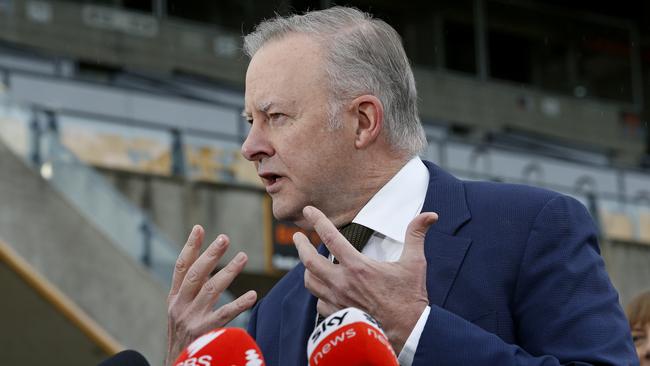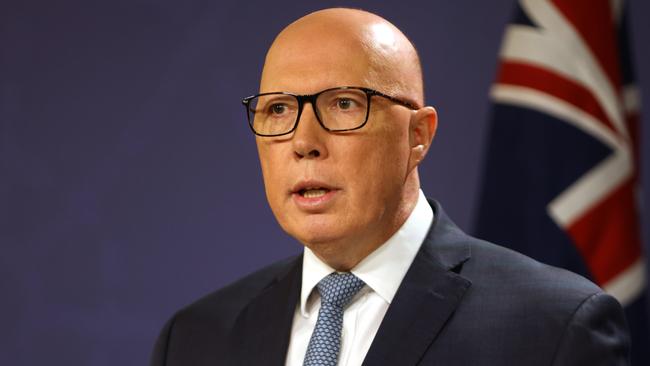Campbell: Dutton going nuclear is making Albanese election strategy easier
To get back in a majority in his own right, Anthony Albanese has to make the next election a referendum on Peter Dutton – and the Opposition Leader is making the job easy for him, writes James Campbell.
Opinion
Don't miss out on the headlines from Opinion. Followed categories will be added to My News.
Whatever you think about Anthony Albanese, you have to admit he can spot a political opportunity.
Opening The Weekend Australian last Saturday to read “Peter Dutton will go to the next election opposing Labor’s 43 per cent carbon emissions reduction target by 2030 but keeping to zero emissions by 2050”, the Prime Minister must have thought all his Christmases had come at once.
For the Opposition Leader to be promising nuclear energy is surely a wonderful thing, but for his opponent to be opening a second front on emission reductions, how good was this! To ram home the message that Dutton is “walking away from climate action”, journalists were treated to the unusual spectacle of not one but two non-sitting week Canberra media conferences as well as raft of one-on-one media appearances, including a Guardian podcast and a chat with that barometer of well-heeled inner-city opinion, The Saturday Paper.

The sudden burst of prime ministerial activity has got some speculating we might soon be headed to the polls. This is highly unlikely for no other reason than if Albo goes now, he won’t get the boundaries in NSW, Victoria and Western Australia that the Australian Electoral Commission has proposed – and which Labor is quite happy with. So he’ll be fighting the election on boundaries that won’t be clear until after the election is called.

What Albo is doing is seizing the opportunity to frame Dutton as he desperately needs to.
With polls already showing most people think that on the cost-of-living crisis, Labor has been pretty useless, it’s as clear as mud that Albo won’t be asking us to give him another three years on the basis of the job he’s been doing. To get back in a majority in his own right, he is going to have to make the next election a referendum on Dutton.
And the Opposition Leader is making the job easy for him. If the Coalition’s actual policy on nuclear energy had been released already, the government would be constrained in its attacks by what it actually says.
But while we wait for the big reveal, Albo and his ministers are at liberty to say whatever they like. As I have said before, the history of selling difficult policies from opposition is not a good one, but maybe this time it will be different. Dutton’s bet would seem to be that the cost-of-living crisis has shifted the debate about energy policy in his direction.
He needs to convince people Labor’s overreliance on renewables is driving up their power bills. And to borrow a favourite quip from a Liberal operator of my acquaintance, this has the additional benefit of being true.
But it’s a risky strategy. To win this debate, Dutton first has to convince people renewables are not the cheapest form of power, something pollsters tell me is going to be a big ask because voters have been repeatedly told the opposite.
If he jumps that hurdle, Dutton’s next fence will be convincing people nuclear power is the answer. And to that not only does he have to win the argument about safety – again a big ask – he also has to convince them it stacks up economically.
But, of course, in reality most people won’t be following the technical arguments about this, will they?
Like so many things in politics, it’s going to come down to the vibe of the thing. On the one side will be Dutton and the Liberals saying to suburban and regional Australia that we believe climate change is a real thing and we need to address it, but only in the next decade and a half and, in the meantime, people shouldn’t have to put up with skyrocketing electricity bills. On the other side will be Albo and the Labor Party saying – especially to the inner-city and teal land – the Liberals have shown again and again they’ve never believed in the reality of climate change and this nuclear thing is a middle-aged male fantasy that won’t and can’t happen.





